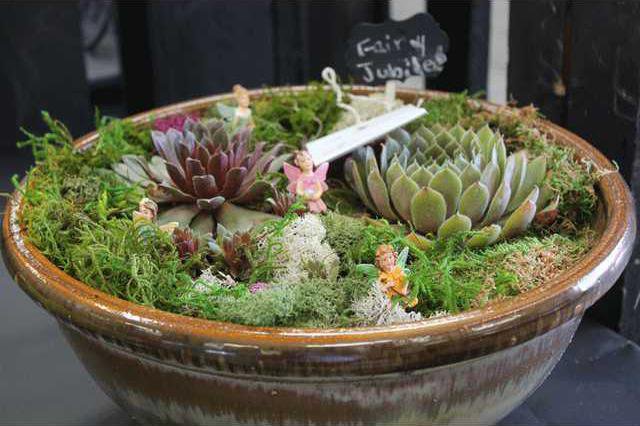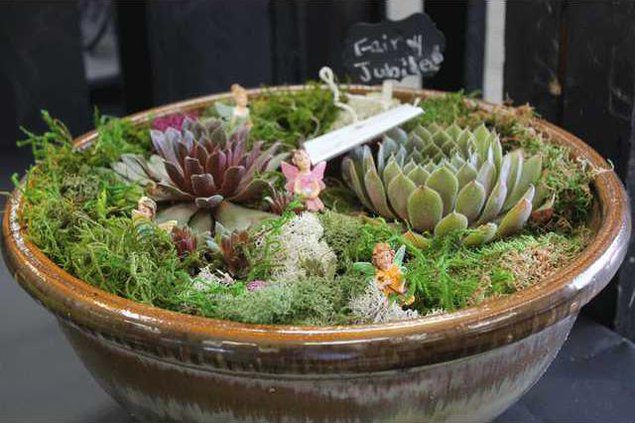Wednesday morning volunteers at Expo 2 at the Barton County Fairgrounds organized displays of vegetables, herbs and flowers for the 2016 Open and 4-H Horticulture judging. For gardeners all over the Golden Belt, it was a chance to show off the area’s best potatoes, onions, carrots, tomatoes, beans and more. Holly Dickman, Ellis County horticultural agent, judged the event. A group of 4-H members gathered around to hear results and ask questions.
Vegetables
“This fair is so early, I realized it is difficult to get good things entered,” she said. Then, she jumped right into vegetable judging, asking who had brought a nearly perfect display of tomatoes. One young 4-Her took credit. Working with her grandfather, the two had handpicked the display from their 49 Jetstar tomatoes.
Dickman explained when she judges, she considers blemishes, discoloration and insect damage among other criteria.
“This plate is really good,” she said.
As she moved onto other vegetables, Dickman took the opportunity to remind entrants that they can consult the Extension booklet, “Exhibiting fruits and vegetables” for tips on preparation and display for fair. Onions, for example, should not be peeled, and should be picked in advance to allow the necks to dry down sufficiently - up to two weeks in advance. Peeling causes the root to deteriorate, and drying time allows the onions to be stored for months, she added.
Carrots, too, should be trimmed, both at the top and the root, and should be as uniform as possible.
“We are at the fair, so things are really being critiqued,” she said. “We want them to be as pretty as possible.”
One 4-H mentor asked Dickman to speak to how potatoes are judged. Again, the biggest thing is uniformity of size and shape. Overall size is not as important, especially among the 4-H entrants. They are judged against the Extension manual’s ideal. Open entrants, however, are subjected to a more competitive ideal, and overall size could play a part in that judging.
“Some of these potatoes have very delicate skin,” she said. “I personally don’t mind if they have a little dirt on them, rather than damage from washing.”
Flowers
Another major area of judging was cut flowers, both individual specimens and arrangements, as well as potted flowering plants and succulents in all the colors of summer. In the open category, two entries for whimsical dish gardens caught the attention and imagination of fair goers passing through the exhibit hall that morning.
Herbs, she said, are tricky in the heat of summer. Ideally, you don’t want them blooming, and taking time to remove damaged leaves can help. Uniform maturity is also difficult.
“Sometimes you’re just limited to what you have in the garden,” she said. That’s okay, just make sure they are all the same.”
Twisting stems, she pointed out, were signs of herbicide damage, likely from drift.
For cut flower arrangements, design, shape, line, and filler were all important. Damaged petals and leaves can take away from the design, Dickman also pointed out.
Because she is a horticulture agent, Dickman admitted she could be a tough judge, and flowers are her particular passion. It can be difficult to find perfect specimen flowers, so she recommends finding the freshest flowers possible early in the morning before judging. One petunia specimen that she awarded a blue ribbon too had a greenish-yellow color on the leaves, Indicating the plant was not getting enough iron. This could have been due to the heavy rains in the area in recent weeks, which could have leached minerals from the soil,” she pointed out.
Above all, she added, judging is based off the opinion of that particular judge on that particular day, so the best take away was the encouragement to ask questions and learn as much as they could.
Mentors needed
Advice like Dickman’s is needed, but to help make that learning possible, more mentors are needed for the horticulture program. It’s a common refrain by Extension agents and 4-H parents who hope more people in the community with gardening know-how will step up.
Barton County 4-H Extension Agent Bernie Unruh said for some time now, volunteers that help mentor members in the Horticulture project are few. Not every club has someone who can help, but it’s something her office has been working on changing.
Next year, Unruh said, she hopes to bring an interview segment to the horticulture judging, but scheduling around livestock judging will be a factor. Also, a volunteer has stepped forward with an interest in helping 4-Hers with horticulture judging, which down the road will mean more young gardeners will be better equipped to identify and understand the needs of the produce and flowers they choose to enter.





